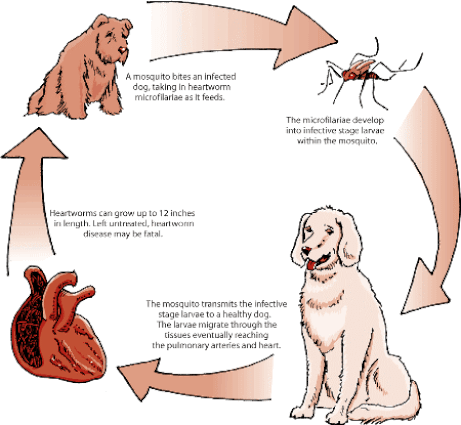 We here at Little Landmines are all about adopting and rescuing pets! We have 2 rescued dogs of our own and one of them was heartworm positive and had to receive treatment before we brought her home from her foster mom. Heartworm disease can be a silent killer, lurking in the shadows and striking when we least expect it. In this blog post, we'll explore what heartworms are, how they affect dogs, and most importantly, how we can protect our dogs from this parasite. Heartworms (scientifically known as Dirofilaria immitis) are parasitic worms that primarily infect dogs but can also affect cats, foxes, and ferrets, among other animals. These worms are transmitted through mosquito bites, making them prevalent in regions with warm and humid climates. The heartworm life cycle begins when an infected mosquito bites a dog, injecting immature larvae into the dog's bloodstream. Over several months, these larvae grow into adult worms, residing primarily in the heart, lungs, and associated blood vessels of the infected dog. One of the most alarming aspects of heartworm disease is its silent nature during the early stages. Dogs may not exhibit any visible symptoms until the infestation has significantly progressed. This makes routine preventive measures and annual check-ups with the veterinarian all the more crucial. As the disease advances, dogs may display various symptoms such as:
If left untreated, heartworm disease can have devastating consequences for dogs. The worms multiply, leading to significant damage to the heart, lungs, and blood vessels. This can result in heart failure, lung disease, and other life-threatening complications. In severe cases, untreated heartworm disease can even be fatal. Fortunately, heartworm disease is preventable. There are several safe and effective preventive medications available, including monthly chewable tablets, topical treatments, and injectable options. These medications work by killing the immature larvae before they can develop into adult worms. Pet owners should discuss the most suitable preventive measures with their veterinarians based on their dog's breed, health status, and lifestyle. If a dog tests positive for heartworms, treatment options are available, but they can be complex, expensive, and may pose risks to the dog's health. Prevention is undoubtedly the best approach, but if treatment is needed, there is usually a recommended 3 doses of an arsenical drug, accompanied by a course of antibiotics and a macrocyclic lactone. This is considered to be the safest, most rapid and most efficacious treatment protocol. Dogs are usually retested after a few months of treatment. At Little Landmines, we believe that knowledge is the key to safeguarding our pets from the hidden dangers they may face. By understanding heartworms and taking proactive steps to prevent them, we can give our dogs the love and care they deserve, safe from this silent menace. Let's work together to keep our furry friends happy, healthy, and heartworm-free!
0 Comments
Leave a Reply. |
AuthorVisit the Dog Blog on Little Landmines for fun musings, puns, tips & tricks by Jennifer Sparks, owner of Little Landmines and resident animal lover Archives
July 2024
Categories |
 RSS Feed
RSS Feed
